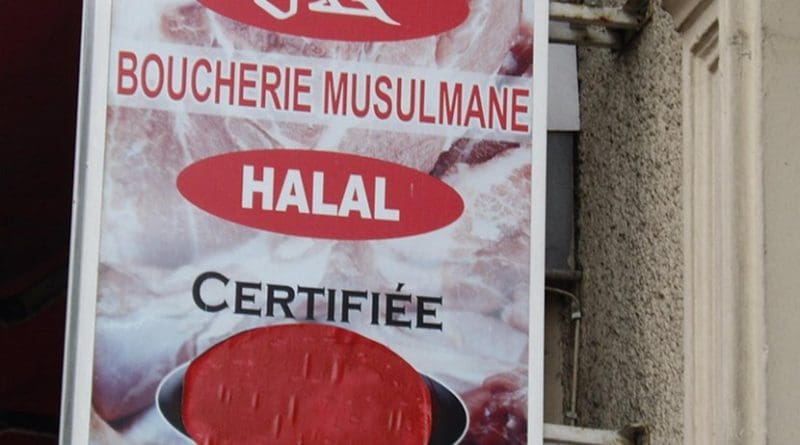EU Court Rules Muslim Animal Slaughter Must Occur In Approved Abattoirs
The European Court of Justice confirmed Tuesday that ritual slaughter without stunning may take place only in an approved slaughterhouse.
According to the EU’s top court, that obligation does not infringe freedom of religion as it is only intended to organize and manage the freedom to practice ritual slaughter, taking into account the fundamental rules on the protection of animal welfare and the health of consumers of meat.
The Muslim Feast of Sacrifice is celebrated each year for three days. A large number of practicing Muslims consider that it is their religious duty to slaughter an animal or have an animal slaughtered, preferably on the first day of that feast, whose meat is then eaten by the family, with the remainder being given to the poor and needy and to neighbors and more distant family relatives. There is a consensus among the majority of Muslims in Belgium, voiced by the Council of Theologians within the Muslim Executive of Belgium, that that slaughter must be carried out without first stunning the animals and in observance of other ritual requirements attached to that slaughter.
From 1998, Belgian legislation provided that slaughter prescribed by a religious rite could be carried out only in approved or temporary slaughterhouses. Therefore, each year the minister responsible approved temporary slaughter houses which, together with approved slaughter houses, were permitted to carry out ritual slaughter during the Muslim Feast of Sacrifice, thereby making up for the lack of capacity of approved slaughterhouses related to the increase in demand during that period.
In 2014, the Minister for the Flemish Region responsible for animal welfare announced that he would no longer give approval for temporary slaughter houses on the ground that such approval is contrary to EU law, specifically the provisions of a 2009 regulation on the protection of animals at the time of killing. From 2015 all slaughter of animals without stunning, even slaughter during the Muslim Feast of Sacrifice, had to be carried out exclusively in approved slaughter houses.
It is in that context that, in 2016, various Muslim associations and an umbrella organization of mosques brought an action against the Flemish Region. In particular, they challenged the validity of certain provisions of the regulation with regard, in particular, to the freedom of religion. The Nederlandstalige rechtbank van eerste aanleg Brussel (Dutch -speaking Court of First Instance, Brussels, Belgium), hearing the case, decided to refer the matter to the Court of Justice for a preliminary ruling.
In Tuesday’s judgment, the Court of Justice states, first of all, that ritual slaughter comes within the definition of ‘religious rite’ within the meaning of that regulation. Therefore, it falls within the scope of the freedom of religion guaranteed by the Charter of Fundamental Rights of the European Union. Possible theological differences on that subject cannot in themselves invalidate that classification as a ‘religious rite’.
The Court also examined whether the regulation constitutes a restriction on the freedom of religion. The Court points out that in the EU, as a general rule, animals are killed only after stunning. By way of derogation, the practice of ritual slaughter without prior stunning is authorized, so long as it is carried out in slaughterhouses approved by the competent national authorities which comply with the technical requirements relating to construction, layout and equipment (those requirements being set out in another EU regulation).
The Court stressed that that derogation does not in any way prohibit the practice of ritual slaughter in the EU, but, to the contrary, it gives expression to the positive commitment of the EU legislature to allow the slaughter of animals without prior stunning in order to ensure effective observance of the freedom of religion, in particular with regard to practicing Muslims during the Feast of Sacrifice.
Therefore, the obligation to carry out ritual slaughter in an approved slaughterhouse simply aims, from a technical point of view, to organize and manage the freedom to carry out slaughter without prior stunning for religious purposes. Such a technical framework is not in itself of such a nature as to restrict the right to freedom of religion of practicing Muslims.
Ritual slaughter is subject to the same technical conditions as those which apply, in principle, to any slaughter of animals within the EU, regardless of the method used, the Court ruled.
Furthermore, the EU legislature has reconciled the observance of the specific methods of slaughter prescribed by religious rites with those of the fundamental rules laid down by the regulations of the EU regarding the protection of the welfare of animals at the time of killing and that of the health of consumers of meat.
Lastly, the Court examined the considerations related to the fact that the approved slaughterhouses situated in the Flemish Region which comply with the requirements of the regulation do not provide sufficient capacity to meet the increase in demand for halal meat recorded during the Feast of Sacrifice.
In that connection, the Court recalls that the validity of an EU measure must be assessed on the basis of the facts and the law as they stood at the time when the measure was adopted and cannot depend on the specific circumstances of a particular case. The issue highlighted by the Belgian court simply concerns a limited number of municipalities in the Flemish Region. Therefore, that issue cannot be regarded as inherently linked to application on an established rule throughout the EU. An occasional problem of lack of slaughter capacity in one region of a Member State, related to the increase in demand for ritual slaughter in the space of several days on the occasion of the Feast of Sacrifice, is the result of a combination of domestic circumstances which cannot affect the validity of the regulation.

